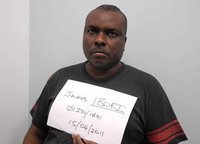Britain starts its own hunt for oligarchs
An unprecedented trial of 53-year-old Nigerian tycoon James Ibori is ongoing in London. This case is now on the front pages of British media. According to the prosecution, the swindler stole $266 million from his historic homeland. We cannot rule out that this is only the visible part of the "iceberg."
His story deserves special attention. He regularly attended a Christian school, then entered a university where he earned a BA in Economics and Statistics. After that, he worked in the oil industry, most profitable in the country, becoming one of the first Nigerian marketers in the petrochemical industry.

However, second-class roles did not appease ambitious Ibori. Seeing that real wealth is given to those who have power, in 1990 he dived into the Nigerian politics, but failed. After that, he went on to seek happiness and ranks in the metropolis.
However, he was not successful there either. Realizing that he would not be able to gain wealth through honest work, Ibori took the path of many of those who were able to break into power. Of course, the path to wealth was not easy. No, he did not rob trains or even speculated the currency like some of the oligarchs.
Ibori and his wife, who worked in a store as cashiers, began to fill the family budget by stealing food. However, it was quickly discovered and they were punished. Since the crime, according to British standards, was minor, the Ibori couple had a relatively easy out.
Apparently, that case inspired James for new feats, for which vigilant British justice again subjected him to criminal prosecution. This time James went even higher, stealing a credit card and cashing out fifteen hundred dollars.
Realizing that petty thefts in the country- former oppressor of Africa would not make him rich, in 1993 Ibori rushed home where power has changed hands. It would seem that the 36-year-old failure had little chances in a country where the path to personal prosperity was open only through the ties with the powers that be.
However, Ibori proved that anything is possible. There is no mentioning of the way he managed to ingratiate himself with the "father of the Nigerian nation," General Sani Abacha.
Yet, it was a key moment in his life that started flourishing. The former petty thief plunged into local politics. Apparently, he found a weak spot of the dictator who had to invest capital exported from Nigeria in the most profitable way. He helped him to make it happen. According to investigators, he helped his boss to launder money through American banks. Apparently, he did it using his position as an official combatting drug.
This sinecure along with the gratitude of the nation's leader allowed Ibori's success to continue. He entered the gubernatorial election in his native state of Delta with a sum of money sufficient for a win.
Despite the fact that in 1998 Abacha died, thanks to his connections, James Ibori retained power and in 1999 won the gubernatorial election in oil-rich Delta state.
Here Ibori started operations on a grand scale. First, he established control over the oil industry of the state, becoming one of the major Nigerian "raw nationalists" advocating the imposition of more severe conditions of production on foreign energy companies. It is no accident that his name is associated with the Movement of Liberation of the Niger delta that regularly captured foreign hostages, demanding a "fair distribution of Nigerian wealth."
In addition, he gave the local market to V-Mobile cellular company. He sent $37 million obtained from the transaction to London, where the governor has already had his own trustees and several bank accounts.
Later, Ibori began buying property abroad. In the UK alone, he bought six houses, showing a taste for the most expensive ones. Of course, like other oligarchs, he arranged expensive British boarding schools for his children.
Suddenly things went south. In 2007 the power in the country once again changed, and the oligarch faced a big problem. He had to part with the governor position, and the new authorities launched an investigation of his conduct. For some time he managed to stay afloat, but in April of 2010, Nigeria's government decided to take him seriously, and he was forced to flee into the jungle to his old friends, the pirates in the Niger Delta. A month later Ibori "surfaced" in the UAE whose authorities extradited him to Britain.
Although at first Ibori tried to present himself as a victim of tyranny and political order, he did not succeed.
Some believe that London chose to cooperate with the new Nigerian authorities that have decided to return the stolen goods. Otherwise, the interests of British oil companies may have been affected. The evidence was incontrovertible: in the end, he has already pleaded guilty to ten counts of money laundering and conspiracy to commit fraud.
Some of the British political analysts and bloggers do not rule out the fact that Britain began a hunt for the oligarchs and general prosecution of those who took out fraudulently gained profits to the shores of Albion. In any case, the incident serves as a warning sign to all those who still consider the UK a safe haven for stolen money.
Sergei Balmasov
Pravda.Ru
Subscribe to Pravda.Ru Telegram channel, Facebook, RSS!




